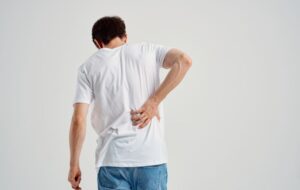
Most people experience back pain at some point in their life. For some individuals, it is a temporary and mild problem; for others, it is an ongoing tribulation. Identifying the cause of the pain can be an important first step toward finding long-term relief. How can you tell the difference between disc and muscle pain in the back? This blog post aims to provide helpful information.
Muscle Pain: Causes, Symptoms, and Relief Tips
Muscle pain in your back frequently results from strain or minor injuries. Lifting heavy objects, twisting your body unexpectedly, or maintaining poor posture for extended periods can trigger muscle pain.
Some common indications of muscle pain in the back include:
- The pain may feel dull, achy, or occasionally sharp if the strain is significant.
- You might notice stiffness, especially when trying to move or bend.
- The pain remains in one spot and does not radiate to other areas.
If you suspect muscle pain, you can try over-the-counter pain medications and allow yourself enough rest. If the injury is minor, your symptoms are likely to improve within mere days.
Disc Pain: Causes, Symptoms, and Warning Signs
Disc pain tends to result from a herniated or bulging spinal disc. Spinal discs serve as cushions between the bones in your spine. When a disc presses on nearby nerves, some severe symptoms can result:
- The pain is likely to feel sharp and intense.
- The discomfort may radiate to your arms, hips, or legs.
- You might notice numbness, tingling, or weakness in your limbs.
- Muscle spasms or sudden loss of strength can occur.
- Rest may not bring relief, and symptoms have the potential to worsen over time.
Without appropriate and timely treatment, disc problems can lead to serious complications.
When to Seek Medical Attention
How can you tell when it is time to see a doctor about your back pain? Here are some signs that medical attention is in order:
- You are experiencing pain that radiates down your legs or arms.
- You notice numbness, tingling, or weakness in your limbs.
- You have lost bladder or bowel control.
- After an injury, you experience severe and sudden pain.
- Your pain has not improved after several days of rest.
Ignoring back pain is not wise! Listen to your body, and if you suspect disc problems, or your pain is causing ongoing challenges in your daily life, reach out to a qualified medical team for assistance.
Meet the Practice
Dr. Paul Tortland is a board-certified specialist in Regenerative Medicine and Sports Medicine. Along with Dr. Tad DeWald, a Sports Medicine specialist, he provides a range of non-surgical solutions for musculoskeletal ailments, including back pain. If your pain is interfering with your life and you are ready to explore treatment options, contact the New England Stem Cell Institute in Glastonbury at 860-430-2821.
